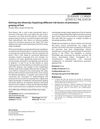81 citations,
December 2007 in “Acta materialia” AFM helped show how hair changes under tension and the effects of damage and conditioner.
 April 2012 in “Informa Healthcare eBooks”
April 2012 in “Informa Healthcare eBooks” Telogen effluvium is a common hair loss condition where many hairs enter the resting phase, often not noticeable until significant loss occurs, and treatment focuses on the underlying cause.
 6 citations,
October 1993 in “The journal of the Royal Society of Health”
6 citations,
October 1993 in “The journal of the Royal Society of Health” Children's hair loss has many causes and requires careful diagnosis and personalized treatment, including emotional support.
 19 citations,
January 2015 in “Journal of Clinical and Diagnostic Research”
19 citations,
January 2015 in “Journal of Clinical and Diagnostic Research” The main causes of diffuse hair loss in women are telogen effluvium and androgenetic alopecia, often related to stress and iron deficiency.
 January 2012 in “International Journal of Trichology”
January 2012 in “International Journal of Trichology” Psychological factors significantly affect hair health, suggesting a need for integrating mental health care in treating hair loss.
 32 citations,
January 1997 in “Dermatology”
32 citations,
January 1997 in “Dermatology” Telogen effluvium is a hair loss condition with acute cases resolving quickly and chronic cases potentially lasting longer, sometimes requiring treatment.
 October 2024 in “Journal of the Pakistan Medical Association”
October 2024 in “Journal of the Pakistan Medical Association” Genetics, nutrition, lifestyle, and hormones affect early grey hair, but more research is needed.
 March 2024 in “Korean Journal of Pharmacognosy”
March 2024 in “Korean Journal of Pharmacognosy” Nymphaea caerulea flower extract can improve scalp conditions by reducing oil, inflammation, stress hormones, and blood vessel issues.
61 citations,
September 1970 in “Journal of the American Geriatrics Society” Anabolic steroids may help prevent aging effects by reducing toxicity, not by their usual functions.
 36 citations,
September 2009 in “Journal of Cellular and Molecular Medicine”
36 citations,
September 2009 in “Journal of Cellular and Molecular Medicine” New treatments targeting skin stem cells show promise for skin repair, anti-aging, and cancer therapy.
6 citations,
January 2020 in “Springer eBooks” Good nutrition is essential for healthy hair.
 12 citations,
January 2005 in “Pediatric Dermatology”
12 citations,
January 2005 in “Pediatric Dermatology” Fox Fordyce disease might be more common in prepubertal girls than thought and can be managed with treatment.
 December 2015 in “Vascular Pharmacology”
December 2015 in “Vascular Pharmacology” Hair papilla cells are crucial for blood vessel development in hair follicles, affecting hair growth and loss.
22 citations,
May 2019 in “Animals” High hair cortisol levels indicate stress in cows due to poor shelter conditions and health issues.
February 2024 in “Animals” Hair loss peaks in spring and regrowth in late summer, with pregnant females losing the most hair.
 1 citations,
February 2023 in “International Journal of Molecular Sciences”
1 citations,
February 2023 in “International Journal of Molecular Sciences” Melatonin improves cashmere goat hair quality by increasing follicles and reducing skin aging.
 October 2024 in “Benha Journal of Applied Sciences”
October 2024 in “Benha Journal of Applied Sciences” Androgenetic alopecia is linked to aging due to inflammation, oxidative stress, and hormonal changes.
 April 2014 in “Journal of evolution of medical and dental sciences”
April 2014 in “Journal of evolution of medical and dental sciences” Women over forty can maintain skin and hair health with lifestyle and dietary changes.
 January 2005 in “Korean Journal of Psychosomatic Medicine”
January 2005 in “Korean Journal of Psychosomatic Medicine” Women with alopecia often experience high levels of anxiety and depression, needing psychiatric help.
 1 citations,
March 2021 in “Dermatological reviews”
1 citations,
March 2021 in “Dermatological reviews” AGA, a common hair loss, is caused by genetics, hormones, age, and environmental factors.
 1 citations,
August 2022 in “Медицинский совет”
1 citations,
August 2022 in “Медицинский совет” The treatment with an oral drug and topical lotion is effective and well-tolerated for hair loss after COVID-19.
 February 2023 in “Research Square (Research Square)”
February 2023 in “Research Square (Research Square)” Applying certain vesicles from umbilical cord stem cells helps heal skin wounds in diabetic mice by reducing cell death and inflammation.
 December 2019 in “Pediatria i Medycyna Rodzinna”
December 2019 in “Pediatria i Medycyna Rodzinna” Alopecia areata is a hair loss condition that may be linked to stress and genetics, often requires psychological support, and has no set treatment.
 7 citations,
December 2018 in “Journal of Cosmetic Dermatology”
7 citations,
December 2018 in “Journal of Cosmetic Dermatology” Eating vegetarian, having allergies, and family history might be linked to getting gray hair early.
3 citations,
January 2021 in “Oxidative Medicine and Cellular Longevity” Nrf-2-modified stem cells from hair follicles significantly improve ulcerative colitis in rats.
 November 2023 in “Frontiers in cell and developmental biology”
November 2023 in “Frontiers in cell and developmental biology” Hair aging is caused by stress, hormones, inflammation, and DNA damage affecting hair growth and color.
 2 citations,
November 2023 in “Frontiers in microbiology”
2 citations,
November 2023 in “Frontiers in microbiology” The health of the gut may be important in developing new ways to prevent, diagnose, and treat alopecia areata.
 9 citations,
March 2000 in “PubMed”
9 citations,
March 2000 in “PubMed” Most women in the study lost hair due to stress, fever, childbirth, surgery, or thyroid issues, with low hemoglobin levels also common.

Many women with PCOS in Saudi Arabia suffer from depression and anxiety.
 9 citations,
August 2020 in “Journal of The American Academy of Dermatology”
9 citations,
August 2020 in “Journal of The American Academy of Dermatology” Many factors, like patient health and how PRP is made, can affect how well PRP therapy works in skin treatments.























